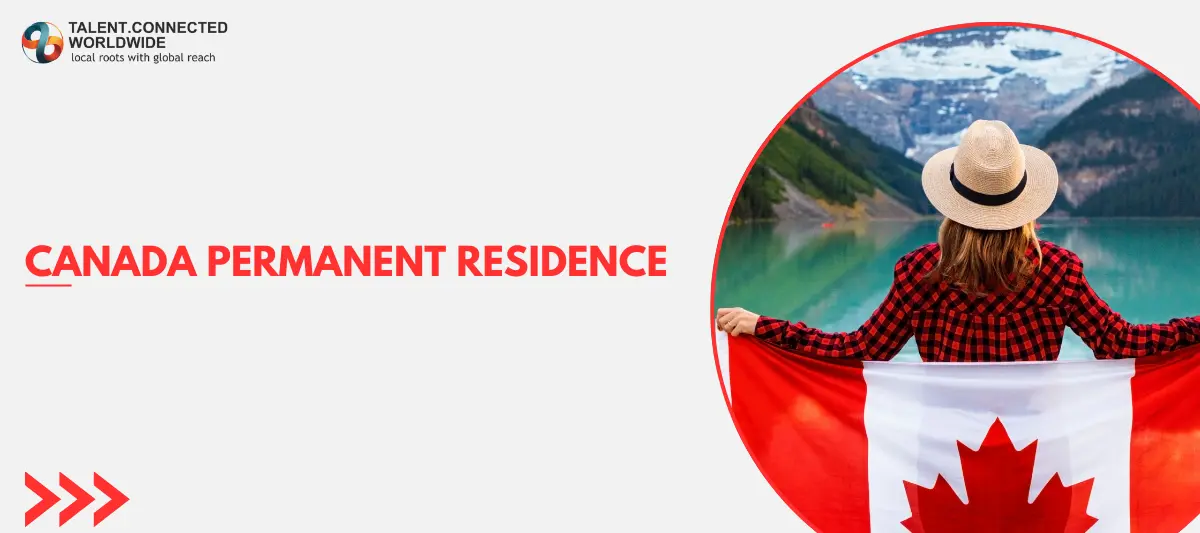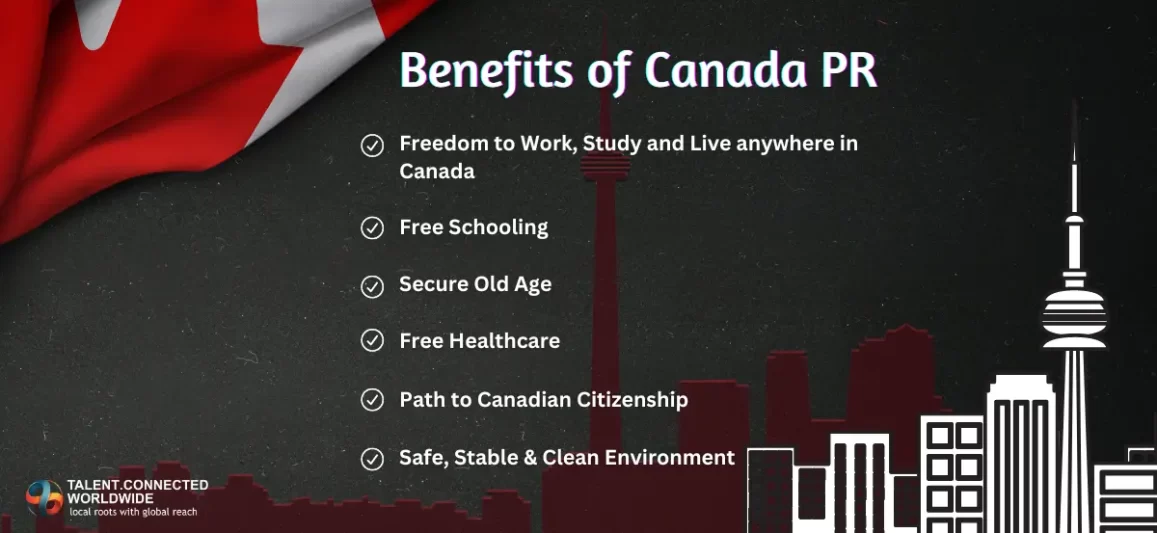
Canada PR stands for Canada Permanent Residence. It is a status given by Immigration, Refugees, and Citizenship Canada (IRCC) to individuals who settle in Canada through various immigration pathways.
What is Canada PR?
A Canada Permanent Resident is an immigrant who settles in Canada by getting a PR visa through an immigration program such as Express Entry, Provincial Nominee Program, etc. Getting a PR status enables an immigrant to enjoy most of the social, economic, and health benefits of being a Canadian citizen.
You can become a Canadian PR through the following pathways.
- Express Entry
- Provincial Nominee Program
- Quebec Selected Skilled Workers
- Atlantic Immigration Program
- Rural and Northern Immigration Pilot
- Agri-Food Pilot
- Caregivers
- Family Sponsorship
- Start-up visa
- Self-employed
- Permanent residence pathways for Hong Kong residents
Benefits

There are many benefits of Canada PR, including:
- Getting a Social Insurance Number (SIN)
- A healthcare coverage
- Equal social benefits as Canadian citizens
- Protection under the Canadian law and the Canadian Charter of Rights and Freedom
- Freedom to live, work, and study anywhere throughout the country
- If you have a Canada PR, you become eligible to apply for Canadian Citizenship.
What are the Limitations of PR?
Canadian Permanent Residency has very few limitations. An immigrant with a PR status cannot:
- Vote or run for any political office
- Work in any job that involves high-level security clearance
- If you are found guilty of committing any grave crime, you (or your family) can be deported from Canada
Requirements
Before applying for permanent residency, make sure that you meet the following PR requirements.
- You are 18 years old or older.
- You are eligible to apply through any one of Canada’s immigration pathways. For example, if you are applying through the Express Entry pathway, you must get an ITA in the draws to be eligible to apply for PR. Similarly, you must get a provincial nomination before applying through the Provincial Nominee Program.
- You must have no criminal record and must be able to prove that you are not a legal, economic, security, or health liability to Canada.
- Sufficient proof of funds (if applicable)
- A successful Immigration Medical Exam (IME)
- Biometrics
Pathways to apply for Canada PR
1. Express Entry System
The Express Entry system is one of the fastest ways to obtain Canadian PR. It manages applications for three main federal immigration programs:
- Federal Skilled Worker Program (FSWP): For skilled workers with foreign work experience.
- Federal Skilled Trades Program (FSTP): For individuals qualified in specific trades.
- Canadian Experience Class (CEC): For individuals with Canadian work experience.
Candidates create an online profile, and their qualifications are assessed through the Comprehensive Ranking System (CRS). Those with the highest scores may receive an Invitation to Apply (ITA) for PR.
2. Provincial Nominee Program (PNP)
The Provincial Nominee Program allows Canadian provinces and territories to nominate individuals for PR based on their skills and job offers. This program is beneficial for those who have specific skills needed in a province. Nominees can apply through two primary pathways:
- Express Entry Process: Candidates who receive a nomination can apply through the Express Entry system, enhancing their CRS score.
- Non-Express Entry Process: Candidates can also apply directly to the province for nomination, leading to PR.
3. Family Sponsorship
Family sponsorship is a pathway for Canadian citizens and PR holders to sponsor relatives to immigrate to Canada. Eligible sponsors can include spouses, partners, children, parents, and grandparents. The sponsorship process requires both the sponsor and the applicant to complete specific forms and submit supporting documents, showcasing their relationship and the sponsor’s ability to provide for the applicant.
4. Quebec Selected Skilled Worker Program (QSWP)
The QSWP is for individuals who wish to reside in Quebec. Applicants must meet eligibility criteria and obtain a Quebec Selection Certificate (CSQ) to apply for PR. This program is distinct from other immigration pathways and is designed to address the unique needs of the province.
5. Atlantic Immigration Program
This program facilitates the immigration of skilled workers and international graduates from Atlantic Canada (Newfoundland and Labrador, Nova Scotia, New Brunswick, and Prince Edward Island) who have job offers from designated employers. It targets candidates with specific skills and qualifications suited for the region.
6. Caregiver Pathways
Caregivers have specific pathways for obtaining PR, focusing on those providing care for children, the elderly, or individuals with disabilities. Different categories are available based on work experience and job offers.
7. Agri-Food Pilot
The Agri-Food Pilot is designed for individuals with experience in the agri-food sector. It addresses labor shortages in the industry by allowing qualified candidates to apply for PR based on their work experience and job offers in eligible positions.
Canada PR processing time
The processing time for Canada PR depends on the immigration pathway you have applied from. The approximate PR processing time for each program is tabulated below.
| Immigration Pathway | Canada PR processing time |
|---|---|
| Economic Immigration | |
| Federal Skilled Worker Program | 5 months |
| Federal Skilled Trades Program | Not available |
| Canadian Experience Class | 5 months |
| Provincial Nominee Program | 6 to 13 months |
| Quebec Selected Skilled Worker | 11 months |
| Atlantic Immigration Program | 8 months |
| Rural and Northern Immigration Pilot | Not Available |
| Agri-Food Pilot | Not Available |
| Business Immigration pathways | |
| Start-up Visa | 40 months |
| Quebec entrepreneurs and investors | 71 months |
| Family Sponsorship | |
| Family Sponsorship of Spouse or common-law partner living in Canada | 12 months (for outside Quebec) 27 months (for inside Quebec) |
| Sponsoring Spouse or common-law partner living outside Canada | 36 months (if sponsoring in Quebec) 10 months (if sponsoring outside Quebec) |
| Dependent Child (living in India) | 09 months |
| Parents or Grandparents | 48 months (in Quebec) 24 months (outside Quebec) |
| Caregivers | |
| Home Child Care Provider: Direct to permanent residence category | 21 months |
| Home Child Care Provider: Gaining experience category | 38 months |
| Home Support Worker: Direct to permanent residence category | 18 months |
| Home Support Worker: Gaining experience category | 31 months |
The processing time for Canada PR is subject to frequent changes. Moreover, it can also be impacted if:
- Your application requires additional information or supplementary documents
- The provided information is not easily verifiable
- You are not as prompt in communications
- IRCC already has a backlog in application processing
Documents Required for Permanent Residency
The complete list of documents for Canadian permanent residency varies according to the immigration pathway you are applying from. However, certain documents are mandatory for Canada PR.
- Travel Documents and Passports
- Proof of language proficiency (IELTS, CELPIP, and PTE test results for English proficiency. TEF and TCF for French language proficiency)
- Police Certificates and Clearances
- Photos
- Birth Certificates
- PR application fee payment receipt
- IMM 0008 – Generic Application Form for Canada
- IMM 5406 – Additional Family Information
- IMM 5669 – Schedule A: Background/Declaration
All your paperwork must either be in French or English. In case they are any other languages, upload the original documents along with their English/French translations
Fees for PR through all pathways
Canada PR fees for various immigration pathways are given in the table below.
| Canada PR Pathways | Canada PR fee |
|---|---|
| Express Entry | CAN $1,525 |
| Provincial Nominee Program | |
| Family Sponsorship | |
| Quebec Selected Skilled Workers | |
| Atlantic Immigration Program | |
| Agri-Food Pilot | |
| Rural and Northern Immigration Pilot | |
| Quebec entrepreneurs and investors | CAN $2,140 |
| Permanent residence pathway for Hong Kong residents: Canadian work experience | CAN $1,085 |
| Permanent residence pathway for Hong Kong residents: In-Canada graduates | |
| Home Child Care Provider: Direct to permanent residence category | |
| Home Child Care Provider: Gaining experience category | |
| Home Support Worker: Direct to permanent residence category | |
| Home Support Worker: Gaining experience category |
Note: Canada PR fee does not include the expenses of biometrics, medical exam, Educational Credential Assessment (ECA), language proficiency tests, and application processing fees of various PNP programs.
Landing in Canada as a Permanent Resident: What You Need to Know
Receiving your eCOPR (Electronic Confirmation of Permanent Residence) does not immediately grant you Canadian Permanent Resident status. The final step occurs when you land in Canada, where you’ll undergo a landing interview at the Port of Entry (POE). Here’s what to expect and the documents you need:
Key Documents to Prepare:
- Electronic Travel Authorization (eTA)
- Passport
- Confirmation of Permanent Residence (COPR) – Don’t sign this beforehand.
- Airline Tickets
- ArriveCAN Submission
- Customs Declaration Form
- List of Accompanied Goods
- Important Certificates: Birth, academic, etc.
- Immunization Records
- Medical Prescriptions (if applicable)
- Proof of Funds
- Job Offer (if applicable)
- Police Clearance Certificate
- Medical Exam Acknowledgement
What Happens at the Landing Interview:
The officer will verify your documents, including asking about:
- Changes in your personal situation
- Criminal records (if any)
- Health-related concerns
You’ll need to provide a Canadian mailing address where your Permanent Resident (PR) card will be sent. If you don’t have one, you can use a third party’s address.
Receiving Your PR Card:
Your PR card will be mailed within 25 days of your landing. If you don’t provide a Canadian address at the time, you must submit one within 180 days. Failing to do so will require you to reapply for a PR card, which comes with a fee of $50 CAD.
Final Step:
After the landing interview, you’ll receive a signed copy of your COPR, marking your official status as a Permanent Resident of Canada.
How to maintain the PR status?
To maintain a PR status, an individual must stay in Canada for at least 730 days in the last 5 years. The stay is not required to be consecutive.
You will not cease to be a Permanent Resident if your PR card expires. You will lose the status if:
- An officer declares that you are no longer a PR after the refusal of a PRTD appeal.
- You renounce the PR status voluntarily
- A removal order against you comes into force
- You become a Canadian citizen
Choose Talent Connected Worldwide
Even though it is not mandatory to hire an immigration consultant, it is extremely necessary. Talent Connected Worldwide is an award-winning CICC-licensed consultant that:
- Explains the immigration process in a simplified way.
- Gives a clear picture of your eligibility
- Helps you decide the best and the fastest way to get PR.
- Trains you for IELTS for free
- Prepares all the mandatory and supplementary documents so that your application is processed quickly and has little chance of rejection.
- Ensures that you get the highest score in the PR points calculator (CRS points calculator)
- Stays informed about all the Immigration updates and the probable changes that might impact your case.


